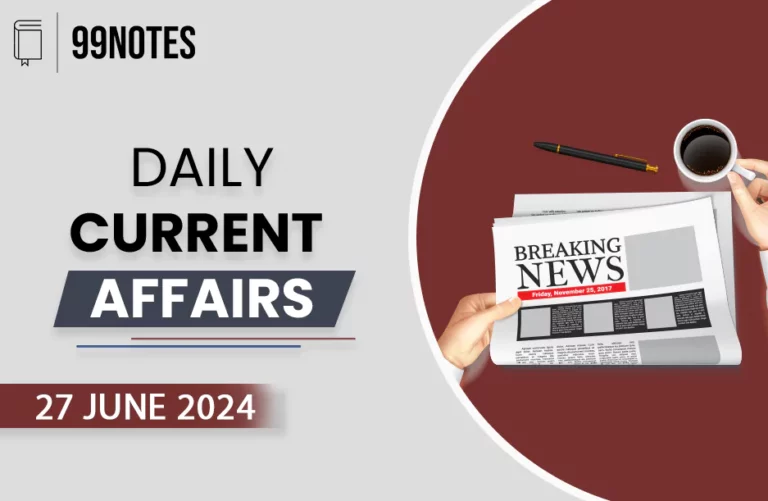20 July 2023 : Daily Current Affairs
DAILY CURRENT AFFAIRS
20-July-2023
Daily Current Affairs For UPSC ,Daily Current affairs of The hIndu and Indian Express.
1. Rajasthan brings in Bill promising minimum income
Topic: GS2, GS3.
Context:
- The Rajasthan Minimum Guaranteed Income Bill, 2023′ was introduced by the Congress-led Ashok Gehlot government in the Assembly.
More information about the news:
- The Bill provides legislative backing for urban employment guarantee schemes and makes pension a legal right with a 15% annual increment.
- The legislation guarantees guaranteed employment for at least 25 additional days in a financial year for adults in rural areas.
- It also provides social security pensions for the elderly, specially-abled, widows, or single women with eligibility, with an annual increment of 15%.
- This is the first time the Urban Employment Guarantee Scheme will get legislative backing, while social security pensions become a legal guarantee for the first time with automatic increments of 15% annually.
Understanding the minimum wage system in India:
- The minimum wage system in India operates on multiple levels, with both the central and state governments setting their respective wage rates.
- Each state has the autonomy to determine its minimum wage, leading to significant variations across different regions.
Minimum Wage System in India:
- Dual System: The minimum wage system in India follows a dual approach, where workers are categorized into skilled, semi-skilled, and unskilled labor, with different wage rates for each category.
- Diverse Sectoral Coverage: The minimum wage covers various sectors, ranging from agriculture and manufacturing to services, construction, and domestic work.
- Wage Fixation: The fixation of minimum wages takes into account various factors, such as living costs, inflation rates, productivity, and regional disparities.
Challenges Faced by the Indian Minimum Wage System:
- Regional Disparities: With each state independently setting its minimum wage, wide disparities exist in wage rates across different regions. This can lead to labor migration and social unrest.
- Enforcement and Compliance: Despite the existence of minimum wage laws, enforcement and compliance remain a significant challenge, especially in the informal sector, where many workers are not covered under the legal framework.
- Inflation and Cost of Living: As inflation rates fluctuate, the real value of minimum wages may erode over time, leading to a diminishing purchasing power for workers.
- Informal Economy: A substantial portion of the Indian workforce is employed in the informal economy, where wage rates are often lower than the prescribed minimum wage. This lack of formalization hinders workers’ ability to demand their rights.
- Unorganized Sector: In the unorganized sector, where collective bargaining is limited, workers often have little negotiating power, making it challenging to secure better wages.
Conclusion:
- The minimum wage system in India plays a crucial role in ensuring social welfare and economic justice for the workforce.
- However, its effectiveness depends on the government’s commitment to equitable wage fixation, improved enforcement mechanisms, and addressing regional disparities.
- To achieve a more inclusive and fair labor market, it is imperative to create an environment that encourages formalization, ensures compliance, and strengthens the bargaining power of workers.
2. Online abuse among college students
Topic: GS3.
Technology-facilitated sexual violence (TFSV):
- Technology-facilitated sexual violence (TFSV) is a growing problem affecting college students in India, particularly young women.
- TFSV can take various forms, including morphed nude images, sexualized blackmail, and explicit messages, leading to severe emotional and psychological consequences for survivors.
Challenges to fighting the issue of TSSV:
- Existing laws in India criminalize some forms of TFSV, but ambiguities in the law and lack of accountability from technology giants hinder effective redressal.
- Institutions of higher education (IHEs) also play a crucial role in addressing TFSV, but many struggle to implement effective prevention and redressal mechanisms.
- There is a need of anonymous helplines, mental health services, workshops, and safety training as measures to address TFSV at IHEs.
- TFSV perpetuates social inequalities and impacts women’s safety and role in society.
- Focusing on the needs of survivors and addressing other intersecting identities like caste, religion, and sexual orientation in TFSV research is essential.
3. SC agrees to list pleas to criminalise marital rape before 3-judge Bench
Topic: GS2.
Context:
- Chief Justice of India D.Y. Chandrachud agreed to list early petitions seeking the criminalization of marital rape.
- The Karnataka High Court had held that a husband could be charged for rape if he had forcible sex with his wife, which was supported by the Karnataka government.
- The Delhi High Court delivered a split verdict on the issue, with one judge striking down Exception Two to Section 375 of the IPC while another rejected the plea to criminalize marital rape.
Marital rape in India:
- Marital rape refers to non-consensual sexual acts by a spouse, a grave violation of a person’s bodily autonomy and dignity.
- In India, Exception Two to Section 375 of the Indian Penal Code (IPC) exempts marital rape if the wife is above 18 years of age, sparking controversies and debate.
- High Courts in different states have delivered divergent judgments on the issue, leading to confusion and legal gaps.
- The Karnataka High Court held that husbands can be charged with rape for forcing sex on their wives, while the Delhi High Court delivered a split verdict, with one judge deeming Exception Two unconstitutional.
- Victims of marital rape endure emotional and psychological trauma, leading to depression, anxiety, and suicidal thoughts.
- Societal norms, stigma, and lack of legal recourse silence victims, hindering their ability to seek justice and protection.
- Removal of Exception Two is crucial to ensure gender equality, bodily autonomy, and respect for women’s rights.
- Addressing marital rape requires collective efforts from the Government, judiciary, and civil society to dismantle gender biases and promote a culture of consent and respect.
4. 40% of districts do not have nursing colleges, Health Ministry data show
Topic: GS3 – Important data from mains perspective.
Important factual data:
- Health Ministry data reveals that 40% of districts in India lack nursing colleges, leading to regional disparities in nursing education and services.
- 42% of nursing institutions are concentrated in five southern states, while three western states have only 17% of such institutions.
- The Centre aims to address this disparity by co-locating 157 new nursing colleges in medical colleges by April 2025 and providing short-term training for nurses.
- India’s nurse-to-population ratio is 2.06:1000, falling short of the global benchmark of 3:1000.
- Only 2% of nursing colleges are present in northeastern states, exacerbating the regional imbalances.
- The WHO highlights a global shortage of health workers, with nurses and midwives representing more than 50% of the current shortage.
5. India climbs seven points to 80 on Passport Index; Singapore at top position
Topic: GS3.
More information about the news:
- India has improved its ranking on the Henley Passport Index, 2023, climbing seven places to reach the 80th rank from 87 last year.
- However, the number of countries allowing visa-free access to Indian passport holders remains unchanged.
- The Henley Passport Index ranks passports based on the number of destinations their holders can access without a prior visa.
- Japan, which held the top position for five years, dropped to the third place, while Singapore now holds the title of the most powerful passport, with visa-free access to 192 travel destinations.
- Germany, Italy, Spain, and several other countries occupy the top ranks on the index.
6. Beaten by mob, couple held for assaulting minor help
Topic: GS3 – Child labour in India.
More information about the news:
- A couple in Dwarka’s Bagdola has been arrested for allegedly assaulting a 10-year-old girl they had brought from Bihar’s Muzaffarpur to work as a domestic help.
- The case came to light when a relative saw the girl being beaten up and informed the Dwarka South police station.
- The couple has been charged under IPC Sections 323, 324, 342, and 370, as well as the Child Labour Act and Section 75 of the Juvenile Justice Act.
Child Labour in India:
- Prevalence: Child labour remains a significant issue in India despite efforts to eradicate it.
- Magnitude: India has one of the highest numbers of child labourers in the world, with millions of children involved in various forms of work.
- Causes: Poverty, lack of access to education, and social norms are among the primary factors driving child labour in the country.
- Agriculture: A large proportion of child labourers are employed in the agricultural sector, facing hazardous conditions and long working hours.
- Informal Sector: Many children work in the informal sector, including domestic work, street vending, and small-scale industries.
- Bonded Labour: Some unfortunate children become trapped in bonded labour, where they are forced to work to repay debts incurred by their families.
- Consequences: Child labour deprives children of their right to education, health, and a safe childhood, leading to a cycle of poverty and limited opportunities.
- Exploitation: Child labourers often face exploitation, physical abuse, and are susceptible to human trafficking and other forms of abuse.
- Legal Framework: India has enacted laws like the Child Labour (Prohibition and Regulation) Act to address the issue, but implementation and enforcement remain challenging.
- Challenges: Weak enforcement mechanisms, corruption, and social acceptance of child labour hinder effective eradication.
For Enquiry

20 July 2023 : Daily Current Affairs

20 July 2023 : PIB

20 July 2023 : The Hindu Editorial Notes PDF

19 July 2023 : Daily Quiz

19 July 2023 : Indian Express

19 July 2023 : PIB

19 July 2023 : The Hindu Editorial Notes PDF

19 July 2023 : Daily Current Affairs

18 July 2023 : Daily Quiz

18 July 2023 : Indian Express
Daily Current Affairs 20 July 2023 : Daily Current Affairs DAILY CURRENT AFFAIRS
19-July-2023
Daily Current Affairs For UPSC ,Daily Current affairs of The hIndu…
PIB 20 July 2023 : PIB PRESS INFORMATION BUREAU
20-July-2023
Daily Current Affairs For UPSC ,The PIB ( Press Information Bureau…
The Hindu 20 July 2023 : The Hindu Editorial Notes PDF The Hindu Editorial
20-July-2023
Daily Current Affairs For UPSC ,The Hindu Editorial Summary
Facebook-f
Twitter
Youtube
1. A…
Daily Quiz 19 July 2023 : Daily Quiz 19 july 2023 : Daily Quiz…
Indian Express 19 July 2023 : Indian Express Indian Express
19-July–2023
The Indian Express, CSE candidates can stay informed about current…
PIB 19 July 2023 : PIB PRESS INFORMATION BUREAU
19-July-2023
Daily Current Affairs For UPSC ,The PIB ( Press Information Bureau…
The Hindu 19 July 2023 : The Hindu Editorial Notes PDF The Hindu Editorial
19-July-2023
Daily Current Affairs For UPSC ,The Hindu Editorial Summary
Facebook-f
Twitter
Youtube
1. A…
Daily Current Affairs 19 July 2023 : Daily Current Affairs DAILY CURRENT AFFAIRS
19-July-2023
Daily Current Affairs For UPSC ,Daily Current affairs of The hIndu…
Daily Quiz 18 July 2023 : Daily Quiz 18 july 2023 : Daily quiz…
Indian Express 18 July 2023 : Indian Express Indian Express
18-July–2023
The Indian Express, CSE candidates can stay informed about current…





